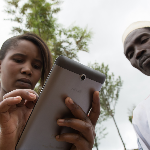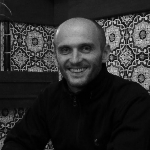
Seeding Science Knowledge by engaging local experts by Geocitizens
Please find below the
Finalist Evaluation
Judges'' ratings
| • | Novelty: | |
| • | Feasibility: | |
| • | Impact: | |
| • | Presentation: |
Judges'' comments
Your proposal has been selected as a Finalist!
Congratulations! Your proposal, Seeding Science Knowledge by engaging local experts in the Adaptation contest, has been selected to advance to the Finalists round.
Be proud of your accomplishment – more than 350 proposals were submitted and only a very small number have been advanced through these two rounds of judging.
As a Finalist, your proposal is eligible for the contest’s Judges Choice award, as well as the contest’s Popular Choice award, which is determined by public voting.
If you haven’t already, you will soon receive an email from the Climate CoLab staff with details about the voting period. If you don’t receive that email within the next day, or have other questions, please contact the Climate CoLab staff at admin@climatecolab.org
All winners will be announced the week after the voting period ends, on September 12, 2015 at midnight Eastern Time.
Both Judges Choice and Popular Choice will receive a special invitation to attend selected sessions at MIT’s SOLVE conference and present their proposals before key constituents in a workshop the next day, where a $10,000 Grand Prize will be awarded. A few select Climate CoLab winners will join distinguished SOLVE attendees in a highly collaborative problem-solving session. Some contests have additional prizes given by the contest sponsor.
Thank you for your work on this very important issue. We’re proud of your proposal, and we hope that you are too. Again, congratulations!
2015 Climate CoLab Judges
Additional comments from the Judges:
This is a strong proposal from a team that has clear experience in the field. The rational for expanding the Tanzanian work to another location is compelling, and the proposed site in Columbia seems well selected. The proposal could be strengthened by providing a more detailed budget.
This project seeks to use technology to spread climate smart ag practices in a locally relevant way. I found it very helpful that there was a pilot in Tanzania. In looking at the Eltzinger et al results, it looked like the secret of success was professionals focused on just two crops, corn and beans, and do the biophysical modeling and walk farmers through the workshops. This project essentially looks to replicate in another place with the same ideas. The main advance here appears to be setting up the technology to solve that part of the replication challenge. A common tech platform across places would help. I think this is a good idea. I also like the idea of another pilot in Cauca, though it wasn't clear that they had lined up the same expertise needed to successfully implement this pilot. The partnership with the local NGO is great but who will do the biophysical measures as Eltzinger et al did in the pilot? Without the tech ag side to go along with the local knowledge, I don't see how this works. That aside, I think a focus on best practices is good too. I think you'd probably need to conduct 5-10 pilots around the world before you could truly have a set of best practices in place. Presumably, with best practices in places and a common technology platform, this would have a chance of going to scale. Getting a large international funder engaged early on, with the capacity to take this to scale, would be a good idea. What about groups like the InterAmerican Development Bank?
Semi-Finalist Evaluation
Judges'' ratings
| • | Novelty: | |
| • | Feasibility: | |
| • | Impact: | |
| • | Presentation: |
Judges'' comments
SUBJECT: Your proposal has been selected as a Semi-Finalist!
Congratulations! Your proposal, Seeding Science Knowledge by Engaging Local Experts in the Adaptation contest, has been selected to advance to the Semi-Finalists round.
You will be able to revise your proposal and add new collaborators if you wish, from July 1st until July 14, 2015 at 23:59pm Eastern Time.
Judges' feedback are posted under the "Evaluation" tab of your proposal. Please incorporate this feedback in your revisions, or your proposal may not be advanced to the Finalists round. We ask you to also summarize the changes that you made in the comment section of the Evaluation tab.
At the revision deadline listed below, your proposal will be locked and considered in final form. The Judges will undergo another round of evaluation to ensure that Semi-Finalist proposals have addressed the feedback given, and select which proposals will continue to the Finalists round. Finalists are eligible for the contest’s Judges Choice award, as well as for public voting to select the contest’s Popular Choice award.
Thank you for your great work and again, congratulations!
2015 Climate CoLab Judges - further comments
We are glad to see the discussion of the "technology-broker" as the question of access and comfort with ICT among farmers is one of the first questions that this project raised for me. But we not clear on how these people will be selected, trained, or rewarded for their participation. Will this be a paid position? Do all communities home someone who is able and willing to fill this role? Could you provide more detail on this.
We would also have liked to see a short discussion of the technical aspects of the platform. Does it run on iOS or Android. Is a smartphone necessary, or can it also be interacted with through text message. Are there technical issues around cellphone coverage, data charges or other that need to be considered? Does the small size of smartphone displays in anyway limit your ability to effectively share the hotspot maps with large groups at the workshops that you plan to hold?
The CSA implementer platform also seems like a smart and targeted evolution from the more general Geo-Citizen platform. What lessons did you learn from geo-citizen that influenced your approach to putting in place the CSA implementer platform?
Finally, we would like to see a discussion of what the value of the ICT approach is compared with more traditional approaches using printed material, training sessions, and workshops. What added value is gained by using ICT approaches, especially in a situation where a "technology-broker" is necessary to ensure participation.
 Anton Eitzinger Jul 13, 2015 10:53 | Proposal creator
Responding to Judges comments and adapted the description in several sections and will provide belows answers to the judges questions:
QUESTION:
We are glad to see the discussion of the "technology-broker" as the question of access and comfort with ICT among farmers is one of the first questions that this project raised for me. But we not clear on how these people will be selected, trained, or rewarded for their participation. Will this be a paid position? Do all communities home someone who is able and willing to fill this role? Could you provide more detail on this.
ANSWER:
The basic idea is that ICT can be the enabler to transform local experts to technology-broker. The projects is linking to ongoing activities in this region (Cauca department of Colombia), leaded by our NGO partner Ecohabitats and carried out under the global CGIAR program CCAFS (Climate Change, Agriculture and Food Security) which has selected the region as its benchmark site. We are providing a methodological framework and technical ready to use platform for CSA outscaling. Within the project we provide an ICT starter kit (including a tablet and airtime), training on how to use it and connect to the different CSA knowledge databases. We work directly with community leader and a selected group of farmer leading and developing currently a local adaptation plan for the region.
QUESTION:
We would also have liked to see a short discussion of the technical aspects of the platform. Does it run on iOS or Android. Is a smartphone necessary, or can it also be interacted with through text message. Are there technical issues around cellphone coverage, data charges or other that need to be considered? Does the small size of smartphone displays in anyway limit your ability to effectively share the hotspot maps with large groups at the workshops that you plan to hold?
ANSWER:
The platform is based on a methodological framework for community problem solving and crowdmonitoring, the GeoCitizen Framework. The technical platform is hosted on a Linux-cloud-platform (amazon), and includes a PostgreSQL spatial database (Postgis) for information storage and access. Following the database-structure, applications can be developed flexible and can access and store data to the central database. Currently we have developed a Webplatform (Joomla + javascript), the CSA Implementer mobile application developed for Android operating system, and we integrate an external platform for text-messaging and voice-surveys. Information access and feedback is gathered through different communication channels, depending on user, device and local context: eg. a complex web-platform for researcher and external experts, tablets (5-7”) for local experts and technicians, and cellphones with simple text messages or voice calls for farmer. For workshops and integration of the participants we combine the ICT tools with traditional participatory tools like printed maps and offline maps on the tablets of technicians. ICT works best when it is combined with traditional participatory methods.
QUESTION:
The CSA implementer platform also seems like a smart and targeted evolution from the more general Geo-Citizen platform. What lessons did you learn from geo-citizen that influenced your approach to putting in place the CSA implementer platform?
ANSWER:
The Geocitizen platform is a general methodological framework for citizen engagement and collaborative approaches to solve issues in communities, often urban communities and within a quality of life context. It offers a community solution for a shared issue. The CSA Implementer is focusing on agriculture and climate change action and modified this general approach to something more towards monitoring of implementation. We have a solution but need to identify local enablers and opportunities by learning from experiences. Here it is important to achieve fast feedback loops between implementers and CSA experts. ICT can fill this gap and offer a cost-effective and real time feedback process for monitoring the implementation of a provided solution
QUESTION:
Finally, we would like to see a discussion of what the value of the ICT approach is compared with more traditional approaches using printed material, training sessions, and workshops. What added value is gained by using ICT approaches, especially in a situation where a "technology-broker" is necessary to ensure participation.
ANSWER:
We do think that ICT is not a new panacea for community work and knowledge transfer, and would not substitute participatory approaches. It works best when it is combined. ICT can clearly provide the following advantages to traditional approaches: effectiveness (lower costs of knowledge transfer), timeliness, directness, inclusiveness through two-way communication, and it can promote collaboration.
|